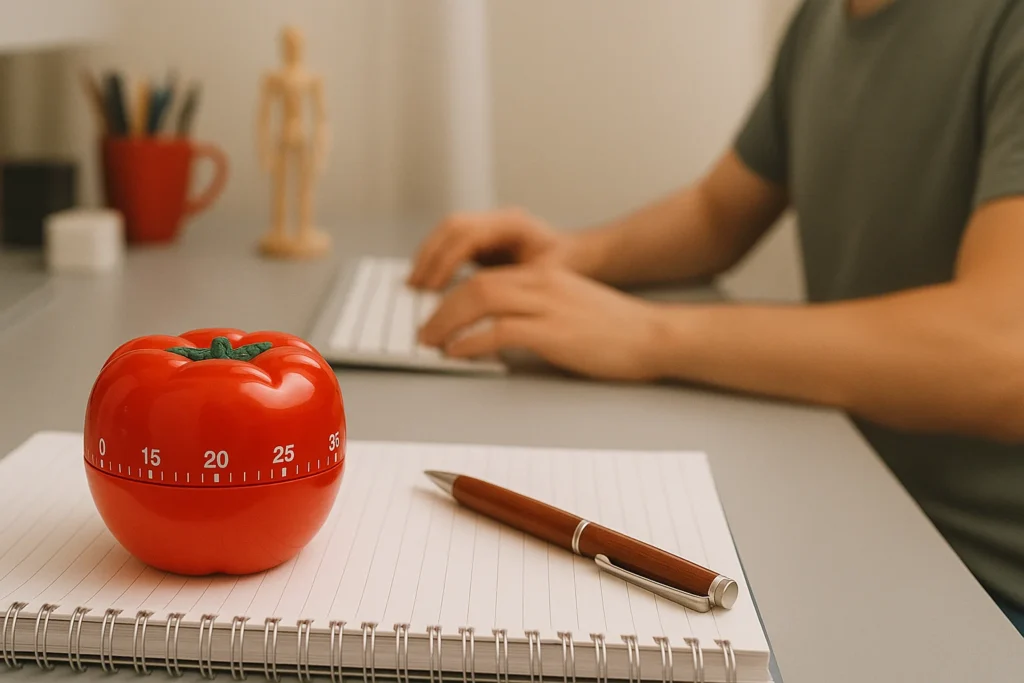Introduction: Revision Is More Than Just Studying Hard
Revision doesn’t need to feel overwhelming, but for many students, it does. Whether it’s finding a place to start, knowing what works, or simply staying focused, GCSE revision can become a source of stress rather than progress.
The good news? You don’t need to study for hours on end to do well. You just need to work with how your brain learns best.
In this guide, you’ll find 10 tried-and-tested revision tips that really work, starting with the Pomodoro Technique, a method that helps you stay focused and avoid burnout. These strategies are designed to help you revise smarter, not longer.

1. Use the Pomodoro Technique to Stay Focused During Revision
By using the Pomodoro Technique, you can turn long, draining sessions into focused sprints — helping you get more done in less time. After four sessions, take a longer 15–20-minute break.
🕒 This method helps you:
- Stay focused without burning out.
- Break big tasks into smaller goals.
- Create a predictable study rhythm.
You can use a Pomodoro timer app or just a kitchen timer to build this routine.
If you’re looking for more ways to prepare effectively, explore our other GCSE revision strategies here.
2. Make a Simple Revision Timetable (and Stick to It)
Planning your time makes revision feel more manageable. A good timetable helps you stay organised, avoid cramming, and fit in breaks too.
✅ Make it realistic.
✅ Include time for breaks and exercise.
✅ Update your plan each week based on your progress.
You can structure your revision blocks using the Pomodoro Technique to stay focused and give your brain time to rest between subjects.
3. Prioritise Topics You Find Tricky
It’s easy to spend time on topics you enjoy, but real progress comes from tackling the ones you find harder.
🗂 Try this:
- Use your subject syllabus to highlight tough areas.
- Try past paper questions without using notes.
- Then check with notes to spot your weak points.
🎯 Focusing on tricky topics builds confidence and helps you learn more in less time
4. Know Your Command Words
Lots of students lose marks because they don’t fully understand what a question is asking.
Words like “explain” or “evaluate” have specific meanings. For example, OCR defines explain as: “Set out the causes of something and/or the factors which influence it.”
🔗 Check this Cambridge International Education guide to command words
Once you know what examiners want, it becomes much easier to write the right kind of answer.
5. Use Past Papers the Right Way
Past papers are one of the most effective revision tools, and not just right before exams.
Here’s how to get the most out of them:
- Practise under timed conditions.
- Mark your answers using the official mark schemes.
- Look at how high-mark answers are structured.
📌 Try this: Use Teepee’s instant AI feedback to see what you’re doing well, and where to improve.
6. Choose a Revision Technique That Works for You
We all learn differently. Find the style that suits you best:
- Visual learners: Try mind maps, diagrams, and colour coding.
- Auditory learners: Record yourself explaining a topic, or use educational podcasts.
- Kinesthetic learners: Use flashcards, model building, or movement-based revision.
📚 Pro tip: Reading and highlighting notes isn’t enough. Active recall and practice make all the difference.
7. Build Writing Stamina with Long-Answer Practice
In subjects like English, History, or Science, you’ll need to write clearly and quickly. Writing under time pressure is a skill you can build.
📝 Start small:
- Write one paragraph a day from a past paper.
- Time yourself.
- Check for clarity, structure, and key points.
Just 10 minutes a day can make a huge difference.
8. Take Care of Your Mental and Physical Health
You can’t revise well if you’re exhausted or stressed. Good habits = better revision.
🧠 Tips to help:
- Aim for 8–9 hours of sleep.
- Take short walks or do light exercise.
- Eat regular meals and drink plenty of water.
- Make time for hobbies and friends.
Looking after yourself is just as important as hitting the books.
9. Focus on Exam Technique, Not Just Knowledge
Knowing the content is important, but so is knowing how to answer questions.
Here’s what examiners look for:
- Underline keywords in the question.
- Show your working in maths and science.
- Plan essays before writing (just a bullet point outline helps!).
📝 AQA says: “Planned answers are often clearer and more coherent.”
10. Don’t Be Afraid to Ask for Help
Getting stuck is normal, what matters is what you do next.
👥 Where to go for help:
- Ask your teacher or tutor.
- Use revision websites or explainer videos.
- Form a study group with friends.
- Try a platform like Teepee for detailed feedback.
Asking questions shows you care about your progress. Don’t be afraid to speak up!
Final Thought: You Don’t Need to Do Everything, Just What Works
You don’t need to revise all day to succeed. You just need a strategy that fits the way you learn best.
Whether it’s using the Pomodoro Technique, planning with past papers, or simply asking for help when stuck, it all adds up.
Students who apply the Pomodoro Technique consistently often report feeling more motivated and in control of their study sessions.
That’s how you revise smarter, not longer.




